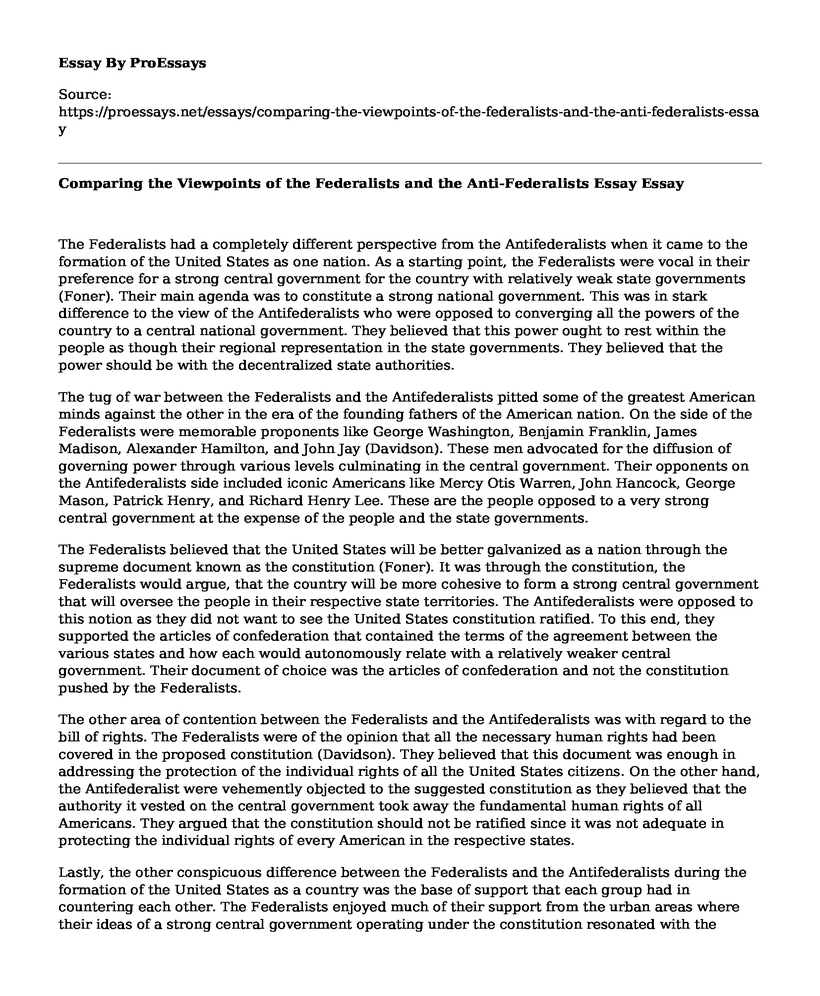The Federalists had a completely different perspective from the Antifederalists when it came to the formation of the United States as one nation. As a starting point, the Federalists were vocal in their preference for a strong central government for the country with relatively weak state governments (Foner). Their main agenda was to constitute a strong national government. This was in stark difference to the view of the Antifederalists who were opposed to converging all the powers of the country to a central national government. They believed that this power ought to rest within the people as though their regional representation in the state governments. They believed that the power should be with the decentralized state authorities.
The tug of war between the Federalists and the Antifederalists pitted some of the greatest American minds against the other in the era of the founding fathers of the American nation. On the side of the Federalists were memorable proponents like George Washington, Benjamin Franklin, James Madison, Alexander Hamilton, and John Jay (Davidson). These men advocated for the diffusion of governing power through various levels culminating in the central government. Their opponents on the Antifederalists side included iconic Americans like Mercy Otis Warren, John Hancock, George Mason, Patrick Henry, and Richard Henry Lee. These are the people opposed to a very strong central government at the expense of the people and the state governments.
The Federalists believed that the United States will be better galvanized as a nation through the supreme document known as the constitution (Foner). It was through the constitution, the Federalists would argue, that the country will be more cohesive to form a strong central government that will oversee the people in their respective state territories. The Antifederalists were opposed to this notion as they did not want to see the United States constitution ratified. To this end, they supported the articles of confederation that contained the terms of the agreement between the various states and how each would autonomously relate with a relatively weaker central government. Their document of choice was the articles of confederation and not the constitution pushed by the Federalists.
The other area of contention between the Federalists and the Antifederalists was with regard to the bill of rights. The Federalists were of the opinion that all the necessary human rights had been covered in the proposed constitution (Davidson). They believed that this document was enough in addressing the protection of the individual rights of all the United States citizens. On the other hand, the Antifederalist were vehemently objected to the suggested constitution as they believed that the authority it vested on the central government took away the fundamental human rights of all Americans. They argued that the constitution should not be ratified since it was not adequate in protecting the individual rights of every American in the respective states.
Lastly, the other conspicuous difference between the Federalists and the Antifederalists during the formation of the United States as a country was the base of support that each group had in countering each other. The Federalists enjoyed much of their support from the urban areas where their ideas of a strong central government operating under the constitution resonated with the urban dwellers (Foner). On the other hand, the Antifederalists message of guaranteeing individual rights, empowering the state governments, and governing under the articles of Confederation received an overwhelming support from the Americans residing in rural areas. This could be explained by the proposal of each camp to either strengthen the central government or the people through their state governments.
Works Cited
Davidson, James W, and Mark H. Lytle. After the Fact: The Art of Historical Detection, Vol. 1, 6th Ed. New York: McGraw-Hill, 2010. Print.
Foner, Eric. Give Me Liberty!: An American History, 5th Ed. New York: W.W. Norton & Co, 2012. Print.
Foner, Eric. Voices of Freedom: A Documentary History, 5th Ed. New York: W.W. Norton & Company, 2017. Print.
Cite this page
Comparing the Viewpoints of the Federalists and the Anti-Federalists Essay. (2022, May 26). Retrieved from https://proessays.net/essays/comparing-the-viewpoints-of-the-federalists-and-the-anti-federalists-essay
If you are the original author of this essay and no longer wish to have it published on the ProEssays website, please click below to request its removal:
- Paper Example on Immigration Policy Changes Due To the 9/11 Attack
- Women in War Essay Example
- Challenges Faced by American (United States) Companies in Foreign Markets
- Essay Example on God Bless the Child: US Response to Juvenile Prostitution
- Report Example on Same-Sex Marriage & Masterpiece Cakeshop: A Religious Standoff
- Understanding Electricity Rates: Demand Response & Tariffs - Report Sample
- Fostering Private-Public Partnerships: The People Concern's Mission to Address Social Challenges - Free Paper







